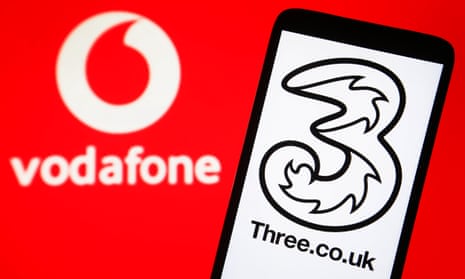The planned merger between Vodafone and Three UK, which would create the UK’s largest mobile phone operator, has been referred to an in-depth investigation by the competition regulator.
The Competition and Markets Authority (CMA) said it intended to refer the deal to a more detailed phase 2 investigation amid concerns that mobile customers could face higher prices and reduced quality.
The merger combines two of the four mobile network operators in the UK and will bring 27 million customers under a single network provider, leapfrogging EE, owned by BT, and Virgin Media O2, owned by Spain’s Telefónica and the US-listed company Liberty Global.
The CMA had already carried out an initial phase 1 investigation looking at whether the deal might lead to a “substantial lessening of competition” and said on Friday it had identified concerns that the transaction could lead to higher prices for customers and lower investment in UK mobile networks.
“The CMA is concerned that combining these two businesses will reduce rivalry between mobile operators to win new customers,” the antitrust regulator said, adding that the deal might make it harder for smaller mobile “virtual” network operators such as Sky Mobile, Lebara and Lyca Mobile to negotiate good deals for their own customers.
Julie Bon, the phase 1 decision-maker for the case at the CMA, said: “While Vodafone and Three have made a number of claims about how their deal is good for competition and investment, the CMA has not seen sufficient evidence to date to back these claims.”
Vodafone and Three UK have five working days to respond with solutions to the CMA, otherwise the deal will be referred to a phase 2 investigation that could take 24 weeks. Those remedies could involve offering to sell a portion of spectrum – the radio frequencies allocated to mobile networks.
Vodafone UK and Three UK, owned by CK Hutchison, said in a statement the regulatory decision had been expected.
Robert Finnegan, the chief executive of Three UK, said: “The current market structure is holding the UK back, which is not good for customers or competition. By creating a third player with the necessary scale to invest, the combination of our two companies will deliver one of Europe’s most advanced networks and move the UK into the digital fast lane, benefiting customers from day one.”
Ahmed Essam, Vodafone UK’s chief executive, said: “Having reached this important milestone, we look forward to working with the independent panel on the phase 2 process.”
The UK had been one of three markets, along with Italy and Spain, that Vodafone’s chief executive, Margherita Della Valle, identified as needing action by Vodafone. Vodafone UK and Three UK are seen as subscale in the UK and are unable to cover their cost of capital and are constrained in their ability to invest.
Last week, Vodafone announced it was taking action in Italy, where it is selling its Italian business to Swisscom for €8bn in cash and it announced last year it was selling its Spanish operations. The proceeds from the sale will go back to shareholders.
after newsletter promotion
Analysts said on Friday they were not surprised by the CMA’s announcement.
Kester Mann, the director of consumer and connectivity at CCS Insight, a company that analyses technology trends, said the Vodafone and Three UK deal was poised “on a regulatory knife-edge” but that if both parties were willing to make further concessions – such as divesting assets such as mobile spectrum – “they might be able to get the deal over the line”.
He said: “My view remains that the deal should be approved. It is better to have three strong providers than two that are dominant and two that are subscale. Blocking it could thwart the long-term development of the UK’s telecom infrastructure.”
However, there have been some calls for the deal to be blocked by the competition authorities. Tommaso Valletti, a professor of economics at Imperial College London and former chief competition economist at the European Commission, said on Friday that past research on telecoms mergers suggested consumer bills would rise.
“The merger will certainly lead to higher prices. I have studied market structure in mobile telephony, and mergers in particular, for the past 25 years. The results of published scientific studies show that, systematically, when markets become more concentrated (for example, through a reduction to three instead of four operators), consumers suffer because they have to pay higher prices. I find it difficult to see how the merger could be approved under any plausible scenario,” he said.
Sarah Carpenter, the executive head of operations at the Unite union, said: “The merger between Three and Vodafone must ring alarm bells for competition authorities. We’ve seen too often how these mega-mergers promise the earth but deliver little more than job cuts and price hikes, all for the sake of corporate profits. The CMA has a clear responsibility to block this deal.”
